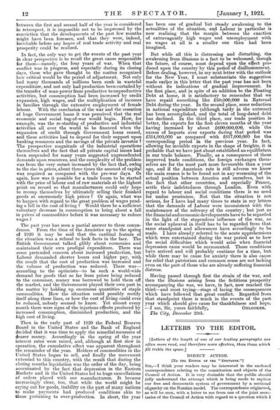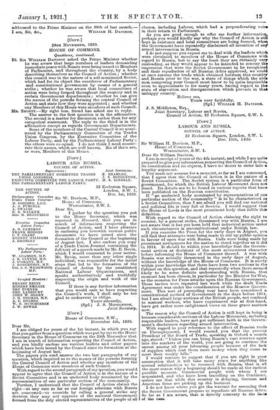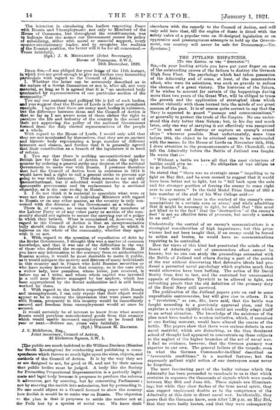LETTERS TO THE EDITOR.
[Letters of the length of one of our leading paragraphs are often more read, and therefore more effective, than those which fill treble the space.] DIRECT ACTION.
ao THE EDIToft OE THE " SPECTATOR."]
think your readers may be interested in the enclosed correspondence relating to the constitution and objects of the Council of Action. It is very desirable that the public should fully understand the attempt which is being made to replace our free and democratic system of government by a sectional oligarchy on the Russian model. The correspondence originated, as will be seen, with a letter to me from one of the joint secre- taries of the Council of Action with regard to a question which I
addressed to tho Prime Minister on the 29th of last month.—
• [Cory.] ?gni NOVEMBER, 1920. HOUSE OF COMMONS.
Questions, continued.
89. Sin Wrrzram DAvisoN asked the Prime Minister whether he was aware that large numbers of leaflets demanding immediate peace with Russia were being issued to Members of Parliament, and throughout the country, by a body describing themselves as the Council of Action • whether this council was in the nature of a self-nominated Soviet, which had for its object the overthrow of Parliamentary and constitutional government by means of a general strike ; whether he was aware that local committees of action were being fonned throughout the country and in certain Government departments ; whether he can give the names of the persons forming the central Council of Action and state how they ware appointed ; and whether any Members of this House were members of such Council.
SHORTE—My right hon. friend has asked me to reply.
The answer to the first question is in the affirmative. The second is a matter for discussion rather than for any categorical statement. The reply to the third is in the affirmative except as regards Government Departments.
Some of the members of the Central Council wore nomi- nated by the Parliamentary Committee of the Trades Union Congress, by the Executive Committee of the Labour Party, and by the Parliamentary Labour Party ; the others were co-opted. I do not think I need enume- rate their names, which are well known. Six of them are, or were, Members of this House.
[COPY.] LABOUR AND RUSSIA.
COUNCIL OF ACTION.
Representing : Joint Secretaries : THE PARLIAMENTARY COMMITTEE TRADES F. BRA3ILEY,
UNION CONGRESS. J. S. MIDDLETON. EXECUTIVE COMMITTEE THE LABOUR PARTY. H. S. LINDSAY. THE PARLiAmp,NTARY LABOUR PARTY.
Parliamentary Committee Sir W. Davison, M.P., Trades Union Congress :
H. GOSLING. L.C.C. House of Commons,
A. A. PURCELL Westminster, S.W. 1.
A. SWALES Dear Sir, It. B. WALKER I gather by the question you put miss M. BONDFIELD to the Home Secretary, which was
reported in Hansard, that you are in search of information respecting the Council of Action, and I have pleasure in enclosing you herewith various public documents we have issued since the formation of the Council at the beginning of August last. I also enclose you copy of a Trade Union Journal containing the The Parliamentary full text of a speech made by Mr. E. Bevin, Labor Party'
which I would commend to your notice.
W. ADAMSON. 3t.P. Mr. Bevin, more than any other single 3. O. CLYNE.% 3LP. J. O'GRADY. M.P onsible for the initial . individual, was resp J. ROBERTSON. DI.P. steps that led to the formation of the
Cot. J. 0. WEDGWOOD, Council of Action by the established
M.P. National Labour Organizations, and
speaks authoritatively and truthfully
Co-opted Members : respecting the origin and work of the Council.
If there is any further information that you would care to have respecting the Council's work, I shall only be too glad to endeavour to oblige.
Yours sincerely,
(Sgd.) J. S. MIDDLETON,
Joint Secretary.
[Cory.] House of Commons, S.W., December 4th, 1920.
Dear Sir, I am obliged for yours of the 1st instant, in which you say
that you gather from a question which was put by ma to the Home Secretary in the House of Commons on the 29th November that I am in search of information respecting the Council of Action, and you kindly enclose me various leaflets and other papers which have been issued by the Council since its formation at the beginning of August last.
The papers you send answer the two last paragraphs of my question, which inquired as to the names of the parsons forming the Central Council of Action and whether any members of the House of Commons were members of such Council.
With regard to the second paragraph of my question, you would appear to agree that the Council of Action is in the nature of a Soviet Committee and is an unelected body nominated by the representatives of one particular section of the community. Further, I understand that the Council of Action claims the right—at any rate so far as our foreign relations with Russia are concerned—to override by calling a general strike any decision they may not approve of the national Government formed from the duly elected representatives of the people of all
ERNEST BEVIN ROBERT MILLIE BEN TURNER GEO. LANSBURY JOHN W. OGDEN J. II. THOMAS. M.P. A. E. HOLMES W. II. HUTCHINSON 3. W. BOWEN Executive Comtnittas Labour Party : A. G. CAMERON FRANK HODGES C. T. CRAMP ROBERT WILLIAMS J. BROMLEY
33 Eccleston Square,
THE COUNCIL OF
ACTION. London, S.W. 1, Dec. 1st, 1920. classes, including Labour, which had a preponderating voice in their return to Parliament.
As you are good enough to offer me further information, perhaps you would kindly say why the Council of Action is still kept in existence and local committees are being formed, when the Government have repeatedly disclaimed all intention of any armed intervention in Russia.
I do pot suppose you expect me to deal with the leaflets which were circulated to members of the House of Commons with regard to Russia, but to say the least they are Certainly very misleading, as they would appear to be intended to convey the impression that were the Soviet Government tte be recognized and their repudiation of all Russian debts approved, we could at once resume the trade which obtained between this country and Russia prior to the war, a state of things which the able men composing your Council must know to be quite impossible even to approximate to for many years, having regard to the State of starvation and disorganization which prevails in that unhappy country.
Believe me, Yours very faithfully., (Sgd) WILLIAM H. DAVISON. J. S. Middleton, Esq., Joint Secretary, Labour and Russia, Council of Action, 32 Eceleston Square, S.W. I.
[Cozen] LABOUR AND RUSSLL COUNCIL OF ACTION.
32 Eceleston Square, London, S.W. L Dec. 11th, 1920.
Sir William H. Davison, M.P., Rouse of Commons, Westminster, S.W. 1.
Dear Sir William Davison, I am in receipt of yours of the 4th instant, and while I am quite prepared to give you information respecting the Council of Action, its constitution and its objects, I have no desire to enter into • lengthy argument.
You must not assume for a moment, so far as I am concerned, that I agree that the Council of Action is in the nature of a Soviet Committee. The Soviet system is a particular form of government, for which the British Labour Movement does not stand. Its details are to be found in various reports that have been published on the Russian constitution.
If " en unelected body nominated by representatives of one
particular section of the community " is to be characterised as a Soviet Committee, then I am afraid you will find our national and political life is very full of Soviets. I would suggest that the House of Lords is the most prominent body that fulfils this definition.
With regard to the Council of Action claiming the right to counter, by a general strike, threatened war with Russia, I am not aware that it has yet been held that industrial action under such circumstances is unconstitutional under British law. If you examine the Press for the early days in August, you will find that attempts were being made to stir up public opinion in favour of open war with Russia. Calls were being made by prominent newspapers for the nation to stand together as it did in 1914. It should be within your knowledge that the Govern- ment arrives at decisions of the most momentous character before informing the House of Commons thereof. A war with Russia was actually threatened in the early days of August, without the knowledge of the House of Commons. It is surely within your knowledge that there have been two sections in the Cabinet on this question, and that repeatedly when there seemed likely to be some definite understanding with Russia, that moment has been chosen, in particular by the Minister for War, as the occasion for Press attacks upon the Russian Government. These tactics were repeated last week while the draft Trade Agreement was under the consideration of the Moscow Govern- ment. This sort of proceeding may have been considered a constitutional method of Government in the days before 1914. but I am afraid large sections of the British people, not confined to manual workers, who have experienced war at first-hand, have got rather more enlightened views on these grave matters now.
The reason why the Council of Action is still kept in being is because considerable sections of the Labour Movement, including responsible leaders, have not got sufficient faith in the Govern- ment's disclaimers regarding armed intervention. With regard to your reference to the effect of Russian trade on Unemployment, I would remind you that the present President of the Board of Trade, speakuig in Oxford a month ago, stated : " Unless you can bring Ruseia's vast reserves again into the markets of the world, you are going to continue the unrest among all your labouring people because of the lack of supplies which cost them more money when they come to meet their weekly bills." I would venture to suggest that if you are right in your assumption that it will take many years for anything like normal relationships to be resumed with Russia, that is all the more reason why a beginning should be made at the earliest possible moment. Commercial people with whom I am acquainted, and who have been travelling on the Continent, assure me that while this country, is delaying, German and American firms are picking up the business. I do not know where you get the warrant for assuming that the Soviet Government propose to repudiate all Russian debts. So far as I am aware, that is directly contrary to the fact* of the case. The intention in circulating .the leaflets respecting ..Peace with Itussia and Unemployment,-.not only to Member* -of the House of Commons, but throughout the constituencies, was -te indicate that the sooner our Government ceases its policy of subsidizing, either with moral- or material sop port, every ter-revolutionary leader, and t9 recognize the realities a Russian position, the better will it be for. all concerned.--- ours faithfully, (Sgd.) J. S. MIDDLETON (Joint Secretary). House of' Commons, S. W.1. .16th December, 1920.
DRAB, .girg;_-1 am, obliged for your .-lettar of the. 11th -instant, In which you are good enough to give mefurther very interesting rs with regard to . the Council of Action.
. Whether the latter can be accurately described as _in the nature of a Soviet Committee or. not is, after all, not very
couriel, so long as it is agreed that It is "an unelected body ted minu by representatives of one particular.. section of the unity." say our national- and political life is full of such bodice, and, youzuggest that the House of Lords is the most prominent *sample. I agree that there are many such bodies in-existence, but the Terence -between them and the Council of -Action is that so far tap I •am aware none of them claims the right to paralyse the he and industry of the country in the event of their not approving the policy of the national Government formed from the duly elected representatives of the people at a whole.
With regard to the ouse of Lords, I would only add that they are not nominated by themselves,-that they are an ancient and hiptorie body representing a large number of different interests and classes, and further that- it is generally .agreed that their constitution as a branch of the legislature as in need of reform. g. You say that there is nothing unconstitutional under British' law for the Council of Action to claim the right to Enter by ordering e. general strait' e any decision of the national vernment to make war with Russia. I presume therefore that had the Council of Action been in existence in 1914 it would have had a. right to call a general strike to prevent our going to war with Germany. This claim seems to me not only unconstitutional, but -.if admitted would involve the end of democratic government and its replacement by a sectional oligarchy, as is the case to-day in Russia. 3. I do not think it is material to -speculate -what were or 'were-not the precise views of individual Ministers with regard to Ituesie or on -any ether matter, -as the country is only con- cerned with the decision of the Government -as a whole. There is, of course, no reason whatever why members of . the labour Party or: of any other. party or section of the com- munity should not agitate to secure the carrying out of a policy in which they believe. What is complained of, however, with regard to the Council of Action is that an unrepresentative body should claim the right to force the policy in which it believes on the whole of the community, whether they agree with it or--not. 4. with regard to the question of repudiation of -debt by the Soviet Government, I thought this was a matter of common knowledge, and that it was one of the difficulties in -the way of those Who desired the re-opening of trade with Russia. If you have any information to the contrary from an authoritative Russian source, it would be most desirable to make it public, . as it would mitigate the anxiety and distress of many individuals in this country and in France who hold Russian securities or who have money invested in that country, as is the case with a widow lady, now penniless, whose letter, just received, is before me as I write, and whose whole capital was invested in a mill near Moscow managed by her nephew, which has been appropriated by the Soviet authorities and is still being worked by them.
5. With regard to the leaflets respecting peace with Russia and unemployment,- I can only repeat that their object would -appear to be to convey the impression that were peace made with Russia, pmty in this country would be immediately -assured and ern -from unemployment would at once be secured.
It would certainly be of interest to know from what source Russia could purchase manufactured goods from this country which would enable increased employment to be found this rear or next.—Believe me, yours very faithfully.
(Sgd.) WILLIAM H. Demote J. S. Middleton, 'Esq.'
Joint Secretary, Council of Action,
82 Ecolestoia Square, S.W. -I.
ale public are much indebted to Sir William Davison (Member ter South 4ensington) for conducting and publishing a °erre- 'pendent* which throws so much light upon the aims, objects, and
.methods of the Council of Action. It is by the way they act
or are designed to act, for good or ill, and not by their names *hat public bodies must be judged. A body like the Society
for Promoting Proportional Representation is a perfectly legiti- mate and legal body because it proposes to produce the reforms it advocates, pot by coercing, but by converting Parliament ; not by starving the nation into submission, but by persuading it. No one could object to a Council formed to show the country how foolish it would be to make war on Russia. The objection to the plan is that it proposes to settle the matter not at the Polls but by a species of social war. We have dealt
elsewhere with the remedy to the Council- of Action, and :will only add here that, till the engine of State is fitted with the safety valve of a popular veto on ill-designed legislation or on oppressive and presumptuous attempts to hold up the Govern- ment, our country -will never be safe - for Demooraey.—En. Spectator.]












































 Previous page
Previous page